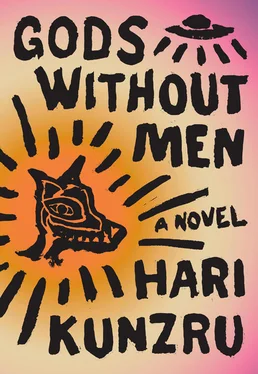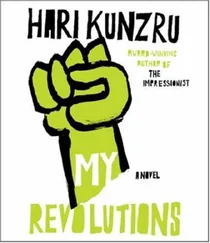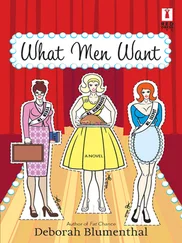When Walter went live, Jaz had an attack of nerves. He wasn’t sure what he was more afraid of: that the model wouldn’t work or that it would. He missed the first few minutes of trading, locked in a bathroom stall. When he came out everyone was celebrating. The rate of return seemed to surprise even Bachman. By the time the U.S. markets closed, Fenton Willis could barely conceal his glee. The traders were high-fiving one another and opening bottles of Krug ’95. Around him, ties were being loosened and plans made to hit a new lap-dancing club. He rang Lisa and told her he was on his way home.
That week people bought cars, ran up ten-thousand-dollar checks at Per Se. Jaz went to Harry Winston and chose Lisa a necklace, a delicate chain of platinum links that coiled in the hand like a very expensive snake. The returns continued to surpass everyone’s wildest dreams, and without waiting for further risk analysis Willis authorized the Walter traders to make much larger bets. Jaz got caught up in the general enthusiasm. His worries appeared ridiculous, the effect of stress and overwork.
Soon afterward, Bachman invited them out to Montauk. It was a beautiful May weekend and Jaz couldn’t wait to get out of the city. The plan was to drive out on the Friday night, but at the last minute Lisa decided she couldn’t leave Raj. Jaz told her she was overreacting, which precipitated a bitter argument.
“Don’t you see?” he yelled. “We have to have a life. We can’t be shackled to him forever.”
“But we are shackled to him. He’s our son.”
“A weekend. It’s just one fucking weekend.”
He lay awake in bed, trying to control his anger; he could feel her body beside him, her back turned to him, walling off her space.
The next morning he finally persuaded her that the highly credentialed new nanny was capable of looking after the boy for one night. They threw their weekend bags into the car and headed out of the city to join the unbroken stream of traffic on the Long Island Expressway. Lisa checked her BlackBerry every few minutes, as if willing some disaster to arise so they had an excuse to go home.
Bachman’s house wasn’t easy to find, even with a GPS. On the third pass they spotted it, a narrow gravel drive leading off the Old Highway, terminating in an automatic security gate, which slid open to let them through. They parked outside an unremarkable modernist villa, low and almost squat, as if it were trying to sink into the earth beneath its sharply pitched roof.
The door was opened by a strikingly good-looking young man, dressed like a J. Crew catalog model, all linen and espadrilles and sandyblond hair. He introduced himself as Chase, took their cases and told them that “Mr. Bachman and Mr. Winter” were outside on the deck. Lisa let out a little gasp when she saw the interior. Even Jaz could tell there were some exquisite things: Bauhaus lamps, a plinth displaying a piece of abstract sculpture that looked like it might be a Brancusi. Most spectacular was the view. The house was built on the cliffside, and the entire rear elevation seemed to be glass, a frame for the gray Atlantic Ocean.
Chase showed them through to the deck, where a table was laid for lunch. It was the first time Jaz had ever seen Bachman dressed in anything other than a suit. He was wearing a pair of tennis shorts; beneath them, his legs poked out like two white twigs. With him was a considerably older man who was introduced as Ellis, his partner. It was clear Ellis was not in the best of health. With Chase’s help, he stood up to greet them. His handshake was a frail, featherlike thing, but his eyes were alert and humorous. Jaz felt like a fool. Why would Cy never have mentioned this man, his lover (apparently) of more than thirty years? Was it because he expected him to disapprove? He could almost hear the conversation. Yes, they’re very prickly about these things, very conservative.
Feeling sweaty from the long drive, they made a little conversation. Ellis had been a plastic surgeon, doing facial reconstructions on burn victims and car-crash survivors. “Never anything cosmetic,” he insisted. “I was an idealist in those days.” Later, when they’d been shown their room, Jaz tried to explain to Lisa why he was annoyed. It wasn’t that he had a problem — not even with Ellis being so much older, or with the fey boy floating about, smirking behind his hand. It was just that he hadn’t known. He’d worked with Bachman for a long time.
“Well,” said Lisa, hanging her evening dress in the closet, “you’ve never been the most observant person.”
They went back down to the pool, where Chase poured iced tea. Fenton Willis and his third wife, Nadia, made their way up from the beach, carrying towels and bottles of water. Willis looked slightly absurd in his weekend clothes — salmon-pink pants printed with a pattern of whales, a yellow silk ascot tied at the neck of his shirt. According to company gossip, Nadia, who was several years younger than Lisa, had been a hostess at some downtown restaurant when they met. She wore a sarong over a shiny silver one-piece swimsuit that looked like it wasn’t really designed for getting wet. Jaz couldn’t help but notice her gym-toned body, which was, he supposed, the point. Cy and Ellis greeted her like a long-lost sister, affecting to find her amusing, instead of trashy. This outburst of camp was another unexpected side of Bachman, and Jaz wasn’t sure what to make of it.
Chase served a lunch of lobster rolls and chowder, accompanied by an excellent white burgundy. Jaz talked to Nadia about a foundation she was starting to benefit orphans in the Ukraine. She intended to host a gala in the fall, “with many celebrities, an atmosphere for people to feel comfortable to open their checkbooks.” Music was piped out to the deck from a system somewhere indoors, a man warbling German songs accompanied by a piano. Lisa identified it as Fischer-Dieskau singing Schubert, which led her into a long conversation with Ellis about some Austrian director who’d used the music in a film. Lisa was clearly a hit with both their hosts. After lunch, Cy found her admiring a Schiele drawing hanging in the living area, and insisted on taking her on an art tour of the house. Jaz tagged along, mainly so as not to get stuck with Willis, who was telling some interminable story about a helicopter safari in Kenya. Each chair, each ornament, appeared to have a rich history. How long must it have taken to assemble such a collection? How much longer to gain the knowledge that lay behind it? Cy appeared particularly proud of an unabashedly sexualized painting of a young man dressed in overalls and an urchin cap, leaning against a brick wall in some kind of expressionist alleyway. Privately Jaz thought it was hideous, the sludgy greens and browns, the offensive bulge at the crotch. It was apparently the work of a noted 1930s black artist, a New York communist who’d worked with the WPA.
That afternoon he dozed by the pool, half listening to Cy and Fenton discussing America’s trading links with China. Fenton had been spending a lot of time in Shanghai, and had developed a sort of obsession with the mutual interdependency of the two countries. Lisa and Nadia were discussing a new boutique that had opened up in SoHo. Jaz knew for a fact that Lisa had never shopped there, but she discussed it as if she were a regular. Back issues of New York magazine, he supposed. Ellis was swimming, bobbing up and down in the water with the aid of two polystyrene floats. Chase was helping him, supporting his legs, retrieving his sun hat when it slid off his head into the water. Jaz watched them from behind his dark glasses, the old man’s frailty, the younger one’s tenderness. There was something about the intimacy of the scene he found upsetting. Where did it end, this paid companionship? Where was the line drawn?
Читать дальше












